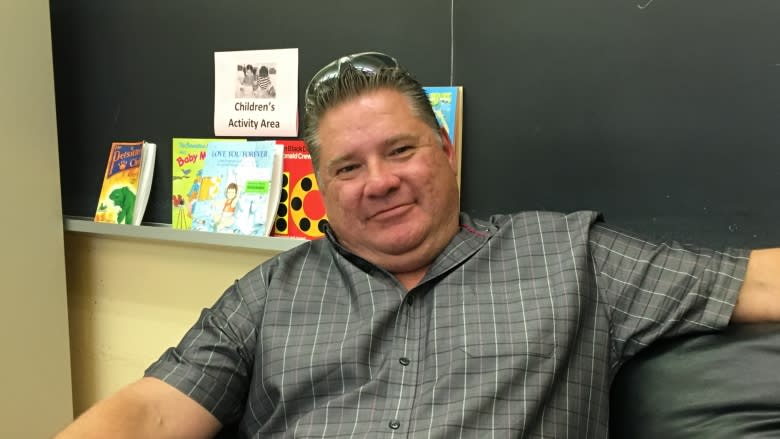Sixties Scoop survivor not eligible for settlement says more victims 'need to be involved'
A survivor of the Sixties Scoop who now lives in Thunder Bay, Ont., says more victims of the forced relocation of Indigenous children need to be compensated and have their stories heard.
William Campbell, 48, was born in Kirkland Lake, Ont., and was one of more than an estimated 5,000 people in northern Ontario taken from their families by child welfare agencies during the scoop. He was adopted into three different homes in what is now Greater Sudbury. Campbell said he was abused in two of them.
An announced $800 million settlement in October ended an almost-decade-long court battle involving a class action lawsuit filed against the federal government by victims of the Sixties Scoop. The agreement applies to those adopted or fostered between 1951 and 1991, however, it doesn't include Métis and many non-status Indigenous people.
As a non-status Indigenous person, Campbell said he doesn't believe he's eligible, despite having joined the class action lawsuit years ago. "It's been a let-down, this whole thing," he said, adding that he feels like he's been shut out of the process.
"People need to be invited to the table," Campbell said. "I'm calling [Minister of Crown-Indigenous Relations] Carolyn Bennett to my table to listen to me, to listen to my story."
"I was adopted three times and I was abused — severely in my very first adoptive home — physically, emotionally, spiritually, and this has to be done properly. All parties need to be at the table," he continued. "I think more victims need to be involved in this."
In a statement, Bennett's office said the settlement announced in October "represents the first step in resolving this issue," and that "there are other claims that remain unresolved, including those of the Métis and non-status [Indigenous people]."
"We remain committed to working with all Indigenous peoples affected by the Sixties Scoop to resolve the remaining litigation through negotiation."
Lawsuits against provinces filed
Some of that negotiation will have to be done with the provinces, according to James Fitz-Morris, the director of communications for Bennett's office, arguing that, while Ottawa has sole responsibility for status First Nations people, it's "shared jurisdiction at best," when it comes to non-status and Métis.
Lawyers have also said Métis were excluded because there were no identifying records for Métis during the relevant period of time.
"We want to have a discussion with all of our partners" about how to reach a settlement, Fitz-Morris said.
There's also the possibility that the remaining claims are dealt with in court. Tony Merchant, a Saskatchewan-based lawyer — who is involved with the settlement with the federal government and the preceding lawsuit — told CBC News his firm has started proceedings against several provinces, including Ontario.
"Those legal actions do two things: first, they seek compensation for Métis and non-status based on the same issues settled by the federal government, which has to do with the loss of culture," he said. "In addition, those actions seek damages for people who were sexually and physically abused when they were put in harm's way."
The class action against Ontario has not been certified, he said.
It doesn't appear, however, that any kind of compensation is coming soon. Merchant said a number of the class actions his firm is pursuing against provincial governments have only been launched within the past couple of years. "Non-status and Métis, we're years from conclusion," he said.
Fitz-Morris didn't offer a timeline for a negotiated outcome but said "we don't want it to linger."
Campbell said survivors have been put through enough. "I don't think victims should have to deal with this another time," he said. "Let's put this thing to bed." He said he would like to see a settlement so he can leave money for his family and the Indigenous education organizations he works for.
Ontario Children's Aid apology 'wasn't done properly' Campbell says
Around the same time Ottawa announced it had reached a settlement with Sixties Scoop victims, the Ontario Association of Children's Aid Societies (OACAS) apologised for its role in the scoop. The apology was done during a gathering at Rama First Nation.
That apology "wasn't done properly," Campbell said, adding that it should have been done in a more formal setting, like the official apology for residential schools in 2008.
"I personally want them to do it again ...not just for me but for all those children, those victims .. that were apprehended," he said.
Mary Ballantyne, the CEO of the Ontario Association of Children's Aid Societies, said, in the two years leading up the gathering at Rama First Nation, the organization "heard from many Indigenous people that it was vital that the gathering and the apology not be an occasion for public grandstanding," and that the OACAS publicized the apology afterward. The organization said it also plans to release a documentary about the gathering and the apology.
Campbell said he'd also like the opportunity to speak with Ballantyne about his experience.
"I think my story needs to be heard," he said. "I can't rest until I do hear that and know that my story has been heard and that my voice is being heard across Canada."




